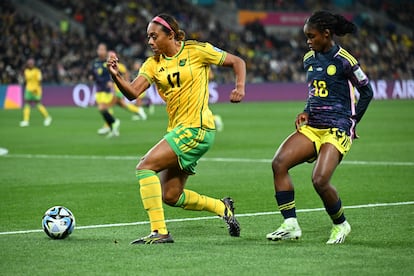A change of pace in women’s football: it is more physical, tactics have improved and there are more women in charge
Coaches from various teams explain that the professionalism and globalization of the game in recent years have produced teams that and are more equally matched and electric to watch, as we have seen in the World Cup in Australia and New Zealand

Women’s World Cup title holders the United States were knocked out of the competition when a penalty missed the goal by a whisker and, as a result, the team was sent packing. Germany, another contender for the trophy, hit the ground face first, and took a memorable thrashing in the group stage. Olympic champions Canada barely made an impression, and the much-vaunted Brazil team also failed to shine. All the competing teams are watching from home now. Except for Spain and England, who will face each other in the World Cup final. Women’s football has changed pace: teams no longer play on artificial turf fields, nor are there gaps in the coaching staff; the prize money assigned by FIFA is $182.65 million for the federations, a figure multiplied exponentially if they were one of the 45 in the 2019 competition or the 23 in 2015. Another step for the already global, professional sport whose pace has balanced the teams regardless of its brief history. José Luis Sánchez Vera, Levante women’s coach; Patricia Campos, one of the first women to lead a professional women’s team in the United States; Lluís Cortés, a former Barcelona and Ukraine coach; and Vero Boquete, a former international now playing for Fiorentina in Italy, explain the change.
More physical, faster pace. FIFA published a study after the 2019 World Cup in which it explained that in four years the ball traveled 11% faster while soccer players covered 15% more average distance in matches. We will have to see the new report when Spain or England are crowned, but everything indicates that the records are continuing to rise because of the professionalism demanded by the international organization and by the federations. “The big difference between football then and now is that the players’ physical condition has improved a lot,” says Cortés. “The teams are physically fitter and that has an impact on a kicking the ball better, faster, and more accurately,” says Campos. “If you compare a photo of any team today with a team from a few years ago, you can see a huge physical change. The teams’ composition and the training have changed a lot, and that makes it possible to play in fewer meters where everything happens a lot faster,” says Sánchez Vera. “It’s that we’ve gone from training three days at 9 p.m. to doing it every morning, to having all the staff that is needed at the highest level, people who give you a bonus on a physical level... That makes the training better and raises the players’ game even higher”, adds Boquete. A clear example was in the semifinal, when Spain faced Sweden, against whom they had always paled in physical comparison, but in New Zealand they played one-on-one and ended up with the ball at their feet.
Tactical deficit. In the previous World Cup, the United States destroyed Thailand (13-0) and FIFA sent the message that the federations should invest in women’s football to take the competition to another level. Although there have also been resounding wins in this tournament (like the 0-7 defeat Vietnam suffered against the Netherlands), we have seen that any team can get the big names in trouble. All the favorites have already fallen, some sooner than others. All apart from England, the current European champions, and Spain, which was showing signs but had never managed to win a knock-out game at a major tournament. “The distance from the big teams, who used to be way above the rest, is closing. Everything has evened out and a surprising picture has remained,” reflects Cortés. “Germany, the United States, and the Nordic countries had dominated in the past because there was an enormous physical and professional difference,” adds Boquete. But there has also been a tactical turn.
“A decade ago, physique was the differential aspect, the big teams had a coaching staff, nutritionists, everything. And the rest, who did not have access to these professionals, presented a lower profile. Now, with everyone equal on this score, we are seeing that the tactical-technical element makes all the difference,” says Sánchez Vera. “When you reduce the physical difference, all that remains is real football,” Boquete remarks. Campos elaborates: “The Germans had too much confidence in themselves, and they didn’t contribute anything new from what we saw in the Euros. They lacked creativity and knowing how to attack deep-lying defenses. The same as the United States, which is not used to playing against European teams. The country’s players noticed this weakness a lot”. Cortés adds: “The United States always won and much of their success was due to their physical condition. But they, like Germany and Brazil, who have talent and physical training, have lacked a clearer collective purpose. They have failed to understand the game and have a plan B in case plan A does not work.” Lineth Beerensteyn, a winger from the Netherlands, went further: “From the beginning they said they were going to reach the final; their mouths were too big. You have to play before you talk.”
Not so small teams. All the African teams (Nigeria, South Africa, and Morocco) reached the round of 16, as did Jamaica from the Caribbean. By the same token, Colombia, a South American team that lacks the cachet of Brazil, was a quarter-finalist, and the Australian team made it to the semifinals. “Banini, an Argentine player, said at the end of her World Cup that the Argentine players would continue fighting, that as a federation they had grown, but that the rest had grown more. And many have done it because the so-called small teams have clearly taken a big step,” comments Sánchez Vera. “Globalization affects football and the FIFA ranking is not real because African teams only play against rivals from their continent, and they don’t improve if they don’t beat higher teams... It’s clear that Nigeria isn’t number 40 in the world,” Campos points out. “They progressed because in those countries some of the players began to play in federations when they were older, the other thing was to play on the street, and in what conditions...? But the level of the coaches has risen, and they have improved”, Boquete clarifies. “Morocco, for example, has a coach (Reynald Pedros) who has won two UEFA Women’s Champions League trophies. The national teams and federations have taken a step forward and the teams are no longer like before,” explains Sánchez Vera. Campos develops her point: “Globalization has arrived. The African soccer player played in anarchy. It was a physical pattern, but now they also have a game model, a tactical context.” This is how Boquete sees it: “There are characteristics in their game and style that should be maintained, but they should be increasingly worked on and organized.” And Sánchez Vera stresses: “The African or Jamaican teams continue to exert a lot of physical strength without losing organization; years ago, they were very chaotic. Not anymore. Added to that, they have physical power. You can see the results.”
The woman in charge. In the 1991 World Cup there was only one woman coach on the 12 teams that participated, the Swede Gunilla Paijkull. “It was very difficult for women to be part of the professional world,” recalls Campos. She is clearly proud because in this tournament up to 12 of the 32 teams are coached by women. “It is already something natural. Any team must have the best manager. If it is a woman, then it has to be her,” Sánchez Vera stresses. “For a while it was imposed from above; UEFA and FIFA encouraged women to join the different coaching staffs even though they were not fully prepared to be on the bench or in sports management; the organizations knew that if they did not force that jump, the opportunity would never come. Now it’s a natural thing, a real option, and they train and measure up by knowledge and skills. The next step will be to see them managing men’s teams,” Boquete sums up. “We won’t see it. If a woman were in charge of Real Madrid — and although it shouldn’t be like that — she couldn’t work. She would be the focus of attention, her decisions would be questioned…” says Campos. “Perhaps the taboos and barriers are elsewhere and not in women’s football,” adds Sánchez Vera. “Let’s say that it is getting closer,” rebuts Boquete; “There are already some in the male game and more will arrive. It will be a struggle because men usually decide and that conditions the decision. The first woman to do it will have to be brave.”
Things that don’t change. Although each soccer player will receive a minimum of $30,418 from FIFA, a study of 362 players revealed that 29% did not receive anything for playing in the World Cup, in the same way that 66% had to ask for permission to attend the tournament from their second job. A flaw still to be improved in women’s football. But the most serious, without a doubt, have been the accusations of sexual harassment made by the Zambian players. Originally revealed by The Guardian, the harassment has supposedly resurfaced during the tournament, since the coach Bruce Mwape was seen rubbing a player’s breasts with his hand. “It is a scandal and respect for women and the game is urgent,” says Campos. “These are issues that it hurts to talk about… It is worrisome. Harassment at work is punished as a crime, although there is always the presumption of innocence. But this episode once again tarnishes the image of the World Cup”, laments Sánchez Vera. “Organizations have to intervene seriously against racism and other abuse,” says Boquete.
Sign up for our weekly newsletter to get more English-language news coverage from EL PAÍS USA Edition
Tu suscripción se está usando en otro dispositivo
¿Quieres añadir otro usuario a tu suscripción?
Si continúas leyendo en este dispositivo, no se podrá leer en el otro.
FlechaTu suscripción se está usando en otro dispositivo y solo puedes acceder a EL PAÍS desde un dispositivo a la vez.
Si quieres compartir tu cuenta, cambia tu suscripción a la modalidad Premium, así podrás añadir otro usuario. Cada uno accederá con su propia cuenta de email, lo que os permitirá personalizar vuestra experiencia en EL PAÍS.
¿Tienes una suscripción de empresa? Accede aquí para contratar más cuentas.
En el caso de no saber quién está usando tu cuenta, te recomendamos cambiar tu contraseña aquí.
Si decides continuar compartiendo tu cuenta, este mensaje se mostrará en tu dispositivo y en el de la otra persona que está usando tu cuenta de forma indefinida, afectando a tu experiencia de lectura. Puedes consultar aquí los términos y condiciones de la suscripción digital.









































